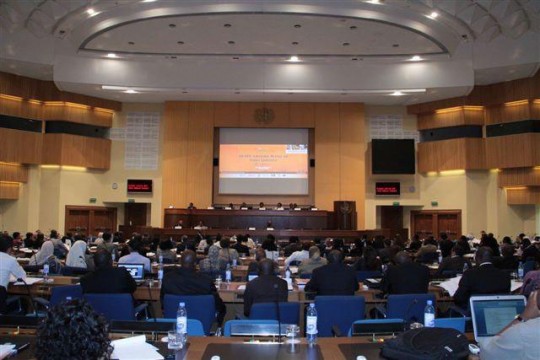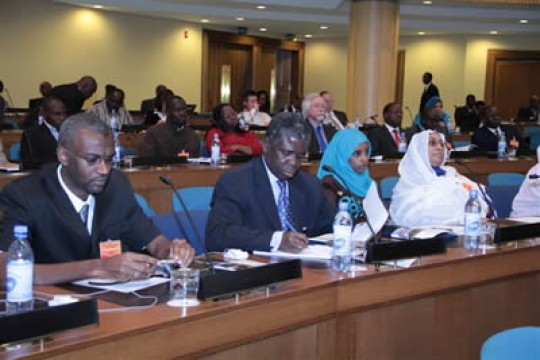UN-backed conference calls for increase in drug research and access to help Africans
UN-backed conference calls for increase in drug research and access to help Africans
26 October 2011
Some 500 participants from Africa’s health-care industry, pharmaceuticals, and health ministers made strong calls for increasing clinical research to improve drugs and their availability in the continent at the African Network for Drugs and Innovation (ANDI) conference, currently being held in Addis Ababa.
The three-day conference, which will conclude tomorrow, is an effort to increase collaboration in Africa’s health sector, and according to a news release issued by the UN Economic Commission for Africa (ECA), it is hoping that the outcomes shared can bolster more funding and support from African governments.
“There are serious fears that Africa may not meet some of the health-related targets of the Millennium Development Goals (MDGs)” said Jennifer Kargbo, Deputy Executive Secretary of the ECA, referring to the eight internationally-agreed goals that seek to slash poverty, hunger, lack of access to health care and education, and a host of other ills, all by 2015.
In her remarks to the conference, delivered by ECA Executive Secretary Abdoulie Janneh, Ms. Kargbo said ANDI is seen as one of the means to achieve the MDGs through the promotion of regional integration and economic growth, as well as strengthening the continent’s capacity and knowledge in the health sector.
###
Conference on drugs and innovation urges governments to support clinical research
Addis Ababa, 26 October 2011 (ECA)
A 3-day conference of the African Network for Drugs and Innovation (ANDI) opened in Addis Ababa this week with strong calls for “support to ensure new and improved drugs, as well as diagnostic, vaccines are made accessible to the African people.” Approximately 500 participants, drawn from the health care industry, pharmaceuticals, partners and ministers responsible for health are in attendance.
“There are serious fears that Africa may not meet some of the health-related targets of the Millennium Development Goals and ECA sees ANDI as one of the tools for achieving the MDGs and promoting regional integration and economic growth,” said Ms. Jennifer Kargbo, Deputy Executive Secretary of the United Nations Economic Commission for Africa (ECA) in her remarks made on behalf of the ECA Executive Secretary, Mr. Abdoulie Janneh.
ANDI is being seen as contributing to much-needed shift towards better collaboration in Africa’s health sector, particularly in clinical research – a move that has been received favorably around the continent by African Ministers responsible for health. The conference hopes that the research outcomes shared this week will help to bolster more funding and support from within Africa, including governments according to Ms. Kargbo.
Echoing this support was Ethiopian Health Minister, Mr. Kebede Worku, who said ANDI will be a fundamental continental key player to enhance medical progress, aimed at turning the results of basic scientific research into “tangible innovative products for the treatment of the plethora of neglected diseases that predominantly affect Africa.”
Ms. Naledi Pando, South African Minister of Science and Technology and head of the ANDI Advisory boardemphasized the need for support because ANDI has shown that “Africa has researchers who are involved in groundbreaking research.” She however pointed out that “the researchers need to get the necessary support and acknowledgement within Africa.”
Ms. Kargbo informed the media at a press conference that the outcomes and dissemination of the research by ANDI would constitute part of the building of capacity and knowledge that is needed within the health sector in Africa.
For her part, Minister Pando told the media that the reports to be shared this week with partners demonstrate that ANDI is determined to draw researchers into a results-oriented collaboration that can create value for Africa and the world.
###
> United Nations (UN).
 The United Nations was established on 24 October 1945 by 51 countries committed to preserving peace through international cooperation and collective security. Today, nearly every nation in the world belongs to the UN: membership totals 192 countries.
The United Nations was established on 24 October 1945 by 51 countries committed to preserving peace through international cooperation and collective security. Today, nearly every nation in the world belongs to the UN: membership totals 192 countries.
When States become Members of the United Nations, they agree to accept the obligations of the UN Charter, an international treaty that sets out basic principles of international relations. According to the Charter, the UN has four purposes:
- to maintain international peace and security;
- to develop friendly relations among nations;
- to cooperate in solving international problems and in promoting respect for human rights;
- and to be a centre for harmonizing the actions of nations.
###
* The above story is adapted from materials provided by United Nations (UN)
** More information at United Nations (UN)






















